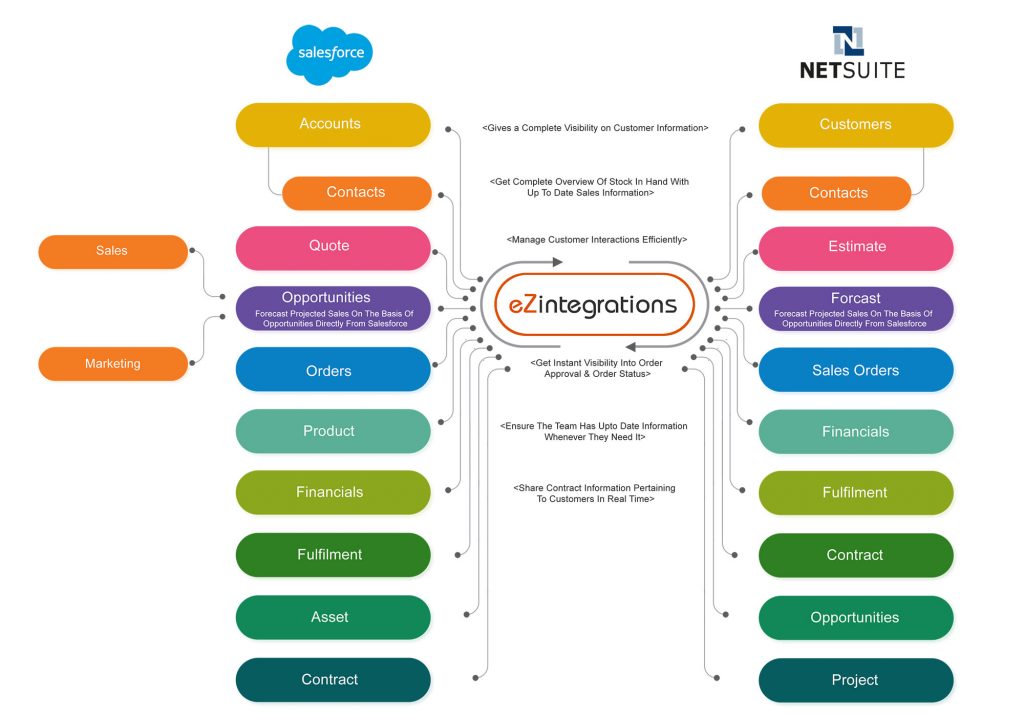Introduction:
In today's fast-paced business environment, optimizing operations and enhancing productivity are paramount. NetSuite and Salesforce stand as stalwarts in their respective domains, offering robust solutions for enterprise resource planning (ERP) and customer relationship management (CRM). However, unlocking their full potential often requires seamless integration. This guide explores the intricacies of NetSuite integration with Salesforce, shedding light on the benefits, strategies, and use cases of this transformative process.
Understanding NetSuite Integration with Salesforce:
NetSuite integration with Salesforce, commonly known as Salesforce to NetSuite integration, bridges the gap between two powerful platforms, enabling seamless data exchange and workflow automation. This integration streamlines business processes, eliminates silos, and empowers organizations to harness the collective power of NetSuite and Salesforce. At its core lies the Netsuite Salesforce connector, a conduit for synchronizing data, optimizing sales operations, and driving business growth.
Key Benefits of Salesforce to NetSuite Integration:
1. Enhanced Data Visibility: By integrating NetSuite with Salesforce, organizations gain a comprehensive view of customer interactions, transactions, and financial data. This unified view enables sales teams to make informed decisions, personalize customer engagements, and drive revenue growth.
2. Streamlined Sales Processes: The NetSuite Salesforce connector automates sales processes, such as lead management, opportunity tracking, and quote-to-cash workflows. Sales reps can seamlessly create quotes, generate sales orders, and track customer interactions within the familiar Salesforce interface, streamlining the sales cycle and accelerating deal closure rates.
3. Improved Customer Experience: A seamless integration between NetSuite and Salesforce enhances the customer experience by providing a 360-degree view of customer interactions, preferences, and purchase history. Sales and support teams can deliver personalized service, address inquiries promptly, and build long-lasting customer relationships.
4. Accurate Sales Forecasting: By synchronizing sales data between NetSuite and Salesforce, organizations can generate more accurate sales forecasts and revenue projections. Advanced analytics and reporting capabilities enable businesses to identify trends, track performance metrics, and optimize sales strategies for maximum impact.
Implementation Strategies for NetSuite Integration with Salesforce:
Successful implementation of NetSuite integration with Salesforce requires careful planning, collaboration, and adherence to best practices. Here are some key strategies to consider:
1. Define Integration Objectives: Clearly define your integration objectives, such as data synchronization requirements, process automation goals, and desired outcomes. Identify the key data entities to be synchronized between NetSuite and Salesforce, such as accounts, contacts, leads, opportunities, and transactions.
2. Choose the Right Integration Approach: Evaluate different integration approaches, such as point-to-point integration, middleware platforms, or custom development. Select an approach that aligns with your business needs, technical capabilities, and scalability requirements.
3. Select a Reliable Integration Tool: Choose a reliable integration tool or platform that offers pre-built connectors, data mapping capabilities, and robust security features. The Netsuite Salesforce connector, available through eZintegrations™, simplifies the integration process and accelerates time-to-market.
4. Configure Data Mapping and Transformation: Define data mapping rules to ensure seamless data exchange between NetSuite and Salesforce. Map fields, objects, and record types to maintain data consistency and integrity across both platforms. Implement data transformation logic to handle data format conversions, field validations, and error handling.
5. Test and Validate Integration: Thoroughly test the integration solution to validate data accuracy, performance, and reliability. Conduct end-to-end testing scenarios, including data synchronization, process automation, and error handling. Involve key stakeholders in user acceptance testing (UAT) to ensure alignment with business requirements.
6. Train Users and Provide Support: Provide comprehensive training to users on how to use the integrated solution effectively. Create user documentation, tutorials, and training materials to support adoption and drive user engagement. Establish a support mechanism to address user queries, troubleshoot issues, and provide ongoing maintenance and enhancements.
Use Cases and Business Scenarios:
Let's explore some common use cases and business scenarios where NetSuite integration with Salesforce delivers tangible benefits:
1. Lead-to-Cash Automation: Streamline the lead-to-cash process by integrating Salesforce leads with NetSuite opportunities, quotes, and sales orders. Automate lead qualification, opportunity conversion, and order fulfillment workflows to accelerate sales cycles and improve revenue visibility.
2. Customer 360° View: Create a unified customer profile by synchronizing customer data between NetSuite and Salesforce. Consolidate account information, purchase history, support cases, and communication logs to provide sales and service teams with a comprehensive view of customer interactions.
3. Quote-to-Cash Optimization: Automate the quote-to-cash process by generating quotes, proposals, and contracts directly within Salesforce. Sync quote data with NetSuite for pricing, inventory availability, and discount approvals, ensuring accurate order fulfillment and revenue recognition.
4. Forecasting and Reporting: Leverage integrated sales and financial data for accurate forecasting, reporting, and analytics. Generate customized dashboards and reports in Salesforce to track sales performance, pipeline metrics, and revenue forecasts, using real-time data from NetSuite.
Conclusion:
NetSuite integration with Salesforce offers a myriad of benefits for businesses seeking to optimize sales processes, enhance customer experiences, and drive growth. By leveraging the power of the NetSuite Salesforce connector, organizations can unlock new opportunities for collaboration, innovation, and competitive advantage. Whether it's automating sales workflows, gaining actionable insights, or delivering personalized customer interactions, the integration between NetSuite and Salesforce empowers businesses to thrive in today's dynamic marketplace. Embrace the potential of NetSuite Salesforce integration and embark.
Read more: Salesforce to NetSuite Integration | Bizdata (bizdata360.com)
For further details, visit our website: Bizdata Inc. | Data Integration (iPaaS) and Data Analytics platform (bizdata360.com)


No comments:
Post a Comment